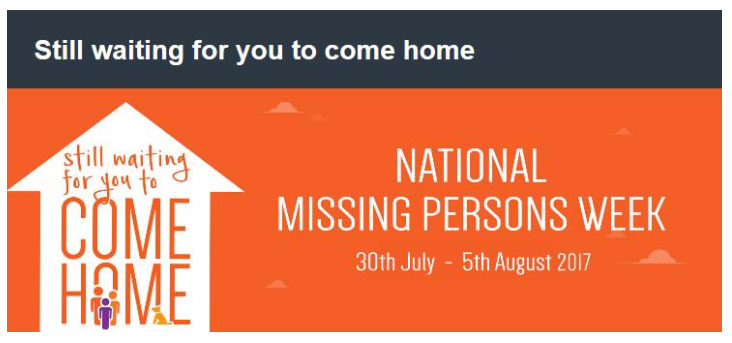National Missing Persons Week (NMPW) 2017 aims to raise awareness around the high number of ‘youth’ who are reported missing to police each year.
The theme of ‘youth’ was selected as an outcome of the AFP commissioned research ‘Missing Persons in Australia 2008 – 2015’ statistical bulletin (PDF 370KB). The research conducted by the Australian Institute of Criminology (AIC) with data supplied by our state and territory police, found three out of five missing persons reports recorded by police related to a young person under the age of 18. Those in the age bracket of 13 to 17 years accounted for 19,000 of the 38,000 or 50% of all missing persons reports recorded by police each year.
The graphics for this year’s campaign, focus on those families left behind following the disappearance of a loved one, with a message not only to youth, but all missing persons; ‘Still waiting for you to come home’. This message provides hope to all families.
Youth Missing

There are many terms that relate to ‘missing’, including disappearance, abduction (both stranger and parental) running away, homelessness, squatting, couch surfing, sleeping rough, staying with friends, going walkabout or just heading off. All these terms can be considered as ‘missing’ if there is a concern for a person’s safety and welfare and their whereabouts are unknown. It may be that young people have been reported missing and don’t realise.
A very small percentage of missing persons cases in Australia are stranger abductions. Young people (those under the age of 18) go missing for a number of reasons including family and social conflict, wanting to become independent, being the victim of crime, forgetting to communicate, mental health problems, drugs/alcohol abuse as well as escaping from other abuse and neglect.
Most young people who are reported missing disappear for short periods of time before either being located or returning home. Going missing is seen by young people as a way of resolving tension or conflict at home or within friendship groups, but if the underlying factors are not addressed when they return and the issues remain, they are at greater risk of going missing again.
Factors that should be considered in determining if a young person is at risk of going missing include deteriorating academic performance, truancy, personality/mood changes, acting out and risk taking behaviors, inappropriate peer groups and substance abuse.
Whilst it is not a crime to go missing there are vulnerabilities present when someone disappears. Lack of access to support, financial constraints, poor hygiene, substance abuse etc. may all impact on a young person’s ability to keep safe.
The AFP are utilizing this week of heightened attention on missing persons to encourage all parents and careers to talk to their children. Talking to your child is one of the best ways to help prevent them from going missing. Seek to build respectful trusting relationships with open communication that is non-judgemental. This provides alternatives for dealing with issues that might otherwise contribute to young people going missing. Click here for more info.


![5 Reasons You Should Travel Alone Airplane [image source: chau nguyen/ http://thedevilhatessweatpants.blogspot.com.au ], crowd ink, crowdink, crowdink.com, crowdink.com.au](https://crowdink.com/wp-content/uploads/2016/08/Chau-airplane-218x150.jpg)





























